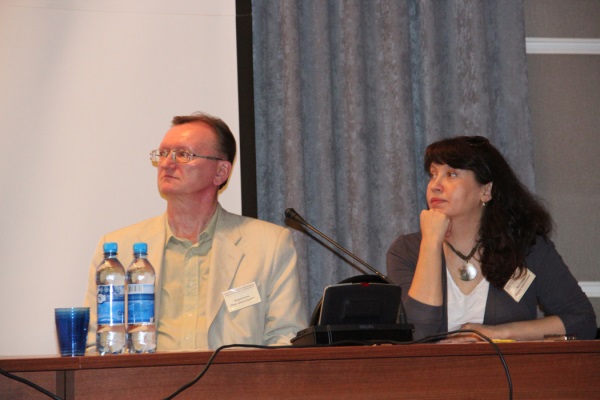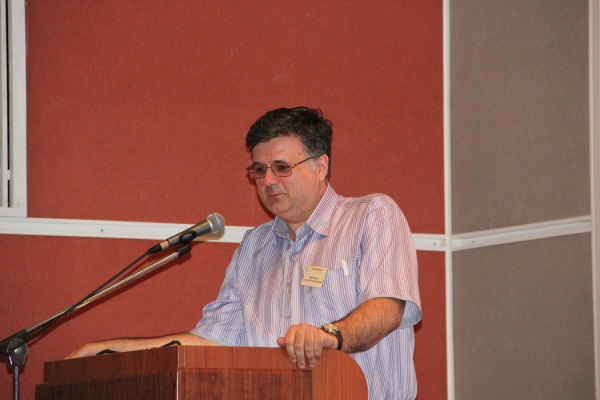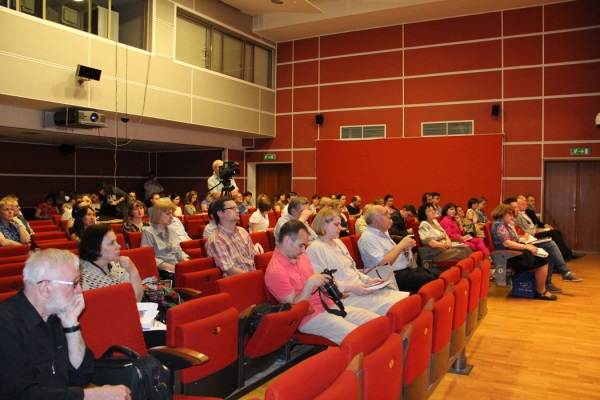 The roundtable E-Resources of Russian Expats: Results, Plans, Opportunities took place at the Alexander Solzhenitsyn Russia Abroad House (RAH) as part of the popular scientific seminar The Russian Expatriate Community: Unknown Pages. The Russkiy Mir portal was also represented among the electronic projects devoted to Russian expats.
The roundtable E-Resources of Russian Expats: Results, Plans, Opportunities took place at the Alexander Solzhenitsyn Russia Abroad House (RAH) as part of the popular scientific seminar The Russian Expatriate Community: Unknown Pages. The Russkiy Mir portal was also represented among the electronic projects devoted to Russian expats.
The Russian Expatriate Community: Unknown Pages seminar deservedly enjoys popularity with the Russia Abroad House's audience as topics of the seminar always reflect most relevant problems of the still young field of research about Russian expats, with leading specialists in this area being involved in the discussion by the seminar moderators O.A. Korostelev, head of the RAH literature and printing business department, and M.A. Vasilyeva, RAH academic secretary.
This time the relevance of the seminar's topic was beyond any question – the number of websites devoted to Russian expats is constantly growing. Almost all of them were created by enthusiasts or groups developing their own areas in different genres: electronic libraries, archives, reference guides and bibliographic databases as well as information resources.

The seminar's organizers saw their mission as understanding through the presentation of individual electronic resources and further joint discussion of their potential, whether those websites could become a universal tool for the researchers of Russian expat communities and whether the pooling of efforts for creating this tool were possible. RAH director V.A. Moskvin, opening the round table, called upon the participants to coordinate their efforts in creating and keeping the websites devoted to Russian expats that various resources would not duplicate, but rather complement each other.
But perhaps the main task of the roundtable was bringing together of like-minded people who dedicated much of their time and best effort to collecting, electronic storing and propagating of the unique heritage of the Russian expatriate community. O.A. Korostelev, introducing the participants, emphasized: many websites to be discussed about are well known to experts, but few of them may boast personal acquaintance with their creators. More so since the geography of the places where these resources were initiated is vast: Germany, France, UK, Prague, Saint Petersburg, Saratov, Moscow. Personal acquaintance will definitely boost further development of resources and may potentially spawn joint projects.

There was a full house with researchers of the Russian expatriate community (historians, philosophers, literary critics etc.), teachers, librarians, museum and archive workers, clergy and amateur researchers gathered at the round table. Many of them arrived from other cities specifically to participate in the seminar. Project creators were asked many questions and the discussion was very stormy. Although the session lasted more than 5 hours, there was not enough time to discuss all the problems, to be sure. Two dozens of speakers asked more questions than answered them as the introduced their resources, though quite a few concrete proposals were put forward about creating new interesting and essential projects.
Seeing that it would be impossible to exhaust the subject matter in one day and that this was just the beginning of a major discussion, the organizers of the seminar suggested that one of the next meeting should again be devoted to electronic resources in order to introduce those of them that have not yet been introduced and to continue the discussion that roused such keen interest.
The librarians from the Russia Abroad House prepared an exposition of periodicals for the roundtable from the library’s collection — printed originals whose digital versions gradually become accessible for all visitors to Russia Abroad House on the internet.
Source: bfrz.ru

 The roundtable E-Resources of Russian Expats: Results, Plans, Opportunities took place at the Alexander Solzhenitsyn Russia Abroad House (RAH) as part of the popular scientific seminar The Russian Expatriate Community: Unknown Pages. The Russkiy Mir portal was also represented among the electronic projects devoted to Russian expats.
The roundtable E-Resources of Russian Expats: Results, Plans, Opportunities took place at the Alexander Solzhenitsyn Russia Abroad House (RAH) as part of the popular scientific seminar The Russian Expatriate Community: Unknown Pages. The Russkiy Mir portal was also represented among the electronic projects devoted to Russian expats. The seminar's organizers saw their mission as understanding through the presentation of individual electronic resources and further joint discussion of their potential, whether those websites could become a universal tool for the researchers of Russian expat communities and whether the pooling of efforts for creating this tool were possible. RAH director V.A. Moskvin, opening the round table, called upon the participants to coordinate their efforts in creating and keeping the websites devoted to Russian expats that various resources would not duplicate, but rather complement each other.
The seminar's organizers saw their mission as understanding through the presentation of individual electronic resources and further joint discussion of their potential, whether those websites could become a universal tool for the researchers of Russian expat communities and whether the pooling of efforts for creating this tool were possible. RAH director V.A. Moskvin, opening the round table, called upon the participants to coordinate their efforts in creating and keeping the websites devoted to Russian expats that various resources would not duplicate, but rather complement each other. There was a full house with researchers of the Russian expatriate community (historians, philosophers, literary critics etc.), teachers, librarians, museum and archive workers, clergy and amateur researchers gathered at the round table. Many of them arrived from other cities specifically to participate in the seminar. Project creators were asked many questions and the discussion was very stormy. Although the session lasted more than 5 hours, there was not enough time to discuss all the problems, to be sure. Two dozens of speakers asked more questions than answered them as the introduced their resources, though quite a few concrete proposals were put forward about creating new interesting and essential projects.
There was a full house with researchers of the Russian expatriate community (historians, philosophers, literary critics etc.), teachers, librarians, museum and archive workers, clergy and amateur researchers gathered at the round table. Many of them arrived from other cities specifically to participate in the seminar. Project creators were asked many questions and the discussion was very stormy. Although the session lasted more than 5 hours, there was not enough time to discuss all the problems, to be sure. Two dozens of speakers asked more questions than answered them as the introduced their resources, though quite a few concrete proposals were put forward about creating new interesting and essential projects.





